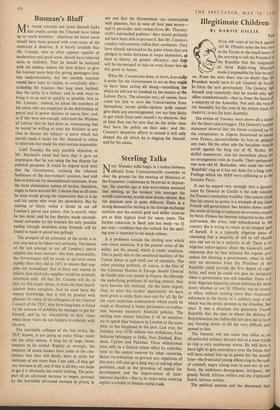Illegitimate Children
By DARSIE GILLIE
WITH 408 votes at his back against 165 M. Pflimlin none the less went to the Elyse in the small hours of the morning to tell the President 01 the Republic that the resignation of three Right-wing Ministers made it impossible for him to carry on. From the start there was no doubt that the President would have to ask General de Gaulle to form the next government. The General had himself said repeatedly that he would only take office constitutionally—that is, from the hands of a majority of the Assembly. Not only the vote of the Assembly but the tone of the debate made his majority, to say the least, doubtful.
The events of Tuesday were above all a defeat for the fixers and arrangers. The General's sudden statement showed that the forces conjured up by the conspirators in Algeria threatened to sweep over France, uncontrollable by him or perhaPe, any man. On the other side the Socialists were in revolt against the long run of M. Monet, the skilful manceuvrer, and his immediate plans for an arrangement with de Gaulle. Their spokesman was now old M. Ramadier, who made the word 'Republic' ring as it has not done for a long time. Feelings within the M RP were stiffening as in the Socialist Party.
It can be argued very strongly that a govern- ment by General de Gaulle is the only solution for France's immediate troubles. One cannot think that his return to power is a triumph of any kind. French self-government has broken down under the strain of trying to maintain an overseas empire by force. France has become subjected to her own instrument, the army, and subordinated to the country she is trying to retain as an integral part of herself. It is a typically Algerian piece of reasoning that a majority of 408 to 165 should turn out not to be a majority at all. There is all Algerian extravagance about the General's calm statement that he had initiated the regular pro- cedure for forming a government, when in fact only an invitation from the President of the Republic could provide the first degree of regu- larity, and even he could not give an invitation when a government was still installed. There is a truly Algerian hypocrisy about debating for three hours whether or not M. Pflimlin was to remain in office, without making more than occasional references to the threat of a military coup d'etat which was the prime element in the situation. But alas! It was a situation too genuinely Fourth Republic that the man to whom the defence of Republicanism has fallen did not turn out to have any burning desire to fill the very difficult part passed to him.
The General will not come into office as an all-powerful military dictator but as a man trying to ride a very unpleasant storm. He will have a hard fight to gain ascendancy over the forces that will have raised him up to power for the second time—the frustrated young officers (up to the rank of colonel), angry young men in and out of uni- form, the ambitious demagogues, intriguers, the greedy North African settlers and the frightened North African settlers.
The political passion and the discontent that have given the General his second chance of office come from a very limited section of the nation. With the majority the determining factor has hitherto been the indifference to public affirs except at election time. When the General was in office for the first time he governed Socialists, Communists and Left-wing Catholic Ministers in a ruined France. Today in a France restored his inevitable allies are nearly all on the Right—in- deed the extreme Right—though he will certainly try to find others of his own choosing. No one knows his ideas on most of the prob- lems with which he will be faced, but this will not necessarily strengthen his hand in dealing with all tile neo-Gaullists who have been utilised by M. Soustelle to create the situation in which the General is invited to act as supreme arbitrator. They know what they want in spheres where they are more at home than he.
Hitherto the world has mainly seen the General's legitimate children, the men brought into French administration and public life when he restored the Republic. Now he is faced with his illegitimate children—a whole generation that has treated the legal State and their obligations to it very lightly, who have created a crisis partly to give him an opportunity of returning to power but still more to rise to power themselves. No, the General certainly does not want to launch out on a career as a dictator at the age of sixty-seven, but he will have some difficulty in preventing a whole brood of would-be dictators offering. themselves for his succession. They will not be loved, though they may be feared.













































 Previous page
Previous page